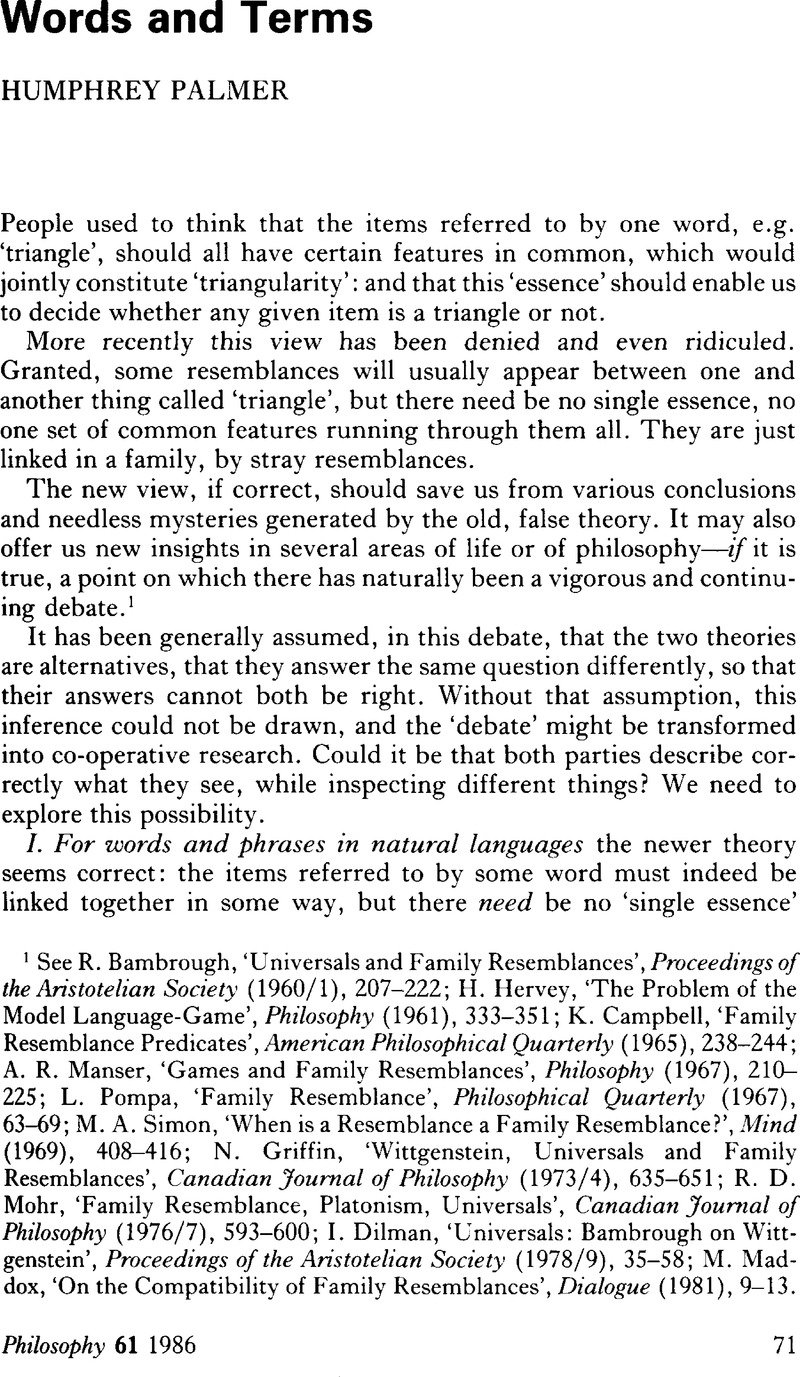No CrossRef data available.
Published online by Cambridge University Press: 30 January 2009

1 See Bambrough, R., ‘Universals and Family Resemblances’, Proceedings of the Aristotelian Society (1960/1961), 207–222;Google ScholarHervey, H., ‘The Problem of the Model Language-Game’, Philosophy (1961), 333–351;CrossRefGoogle ScholarCampbell, K., ‘Family Resemblance Predicates’, American Philosophical Quarterly (1965), 238–244;Google ScholarManser, A. R., ‘Games and Family Resemblances’;, Philosophy (1967), 210–225;;CrossRefGoogle ScholarPompa, L., ‘Family Resemblance’, Philosophical Quarterly (1967), 63–69;CrossRefGoogle ScholarSimon, M. A., ‘When is a Resemblance a Family Resemblance?’, Mind (1969), 408–416;CrossRefGoogle ScholarGriffin, N., ‘Wittgenstein, Universals and Family Resemblances’, Canadian Journal of Philosophy (1973/1974), 635–651;Google ScholarMohr, R. D., ‘Family Resemblance, Platonism, Universals’, Canadian Journal of Philosophy (1976/1977), 593–600;Google ScholarDilman, I., ‘Universals: Bambrough on Wittgenstein’, Proceedings of the Aristotelian Society (1978/1979), 35–58;Google ScholarMaddox, M., ‘On the Compatibility of Family Resemblances’, Dialogue (1981), 9–13.Google Scholar
2 Locke, Essay III, 2, iii (example of gold) describes learning as gradually collecting the features that belong. This same process is later described, from another angle, as forming a general idea from several particular ones by disregarding their peculiarities (III, 3, vii, man). The occasions for such learning are said to be just ‘observation’, not specifically conversation or auditing of word-usage; Locke wrongly thinks we must get an idea first and label it afterwards. But we need not attribute two opposed theories to Locke, as does Clark, E. V. in Cognitive Development and the Acquisition of Language, Moore, T. E. (ed.) (New York: Academic Press, 1973), 68, 72.Google Scholar
3 See examples in Bloomfield, L., Language (London: Allen and Unwin, 1935), 431.Google Scholar
4 Compare Groom, B., A Short History of English Words (London: Macmillan, 1966), 136.Google Scholar
5 Haas, W., ‘Meanings and Rules’, Proceedings of the Aristotelian Society (1972/1973), 149.Google Scholar
6 Compare Pratt, V., ‘Biological Classification’, British Journal for the f Philosophy of Science (1972), 323: science cannot start until we form inductive groups.Google Scholar
7 See Goodman, N., Fact, Fiction and Forecast (New York: Bobbs-Merrill, 1973), 74f.Google Scholar
8 Beckner, M. O., The Biological Way of Thought (New York: Columbia University Press, 1959), 22f.Google Scholar
9 I am grateful to Mr V. Pratt and Professor W. Haas for helpful comments on earlier drafts.